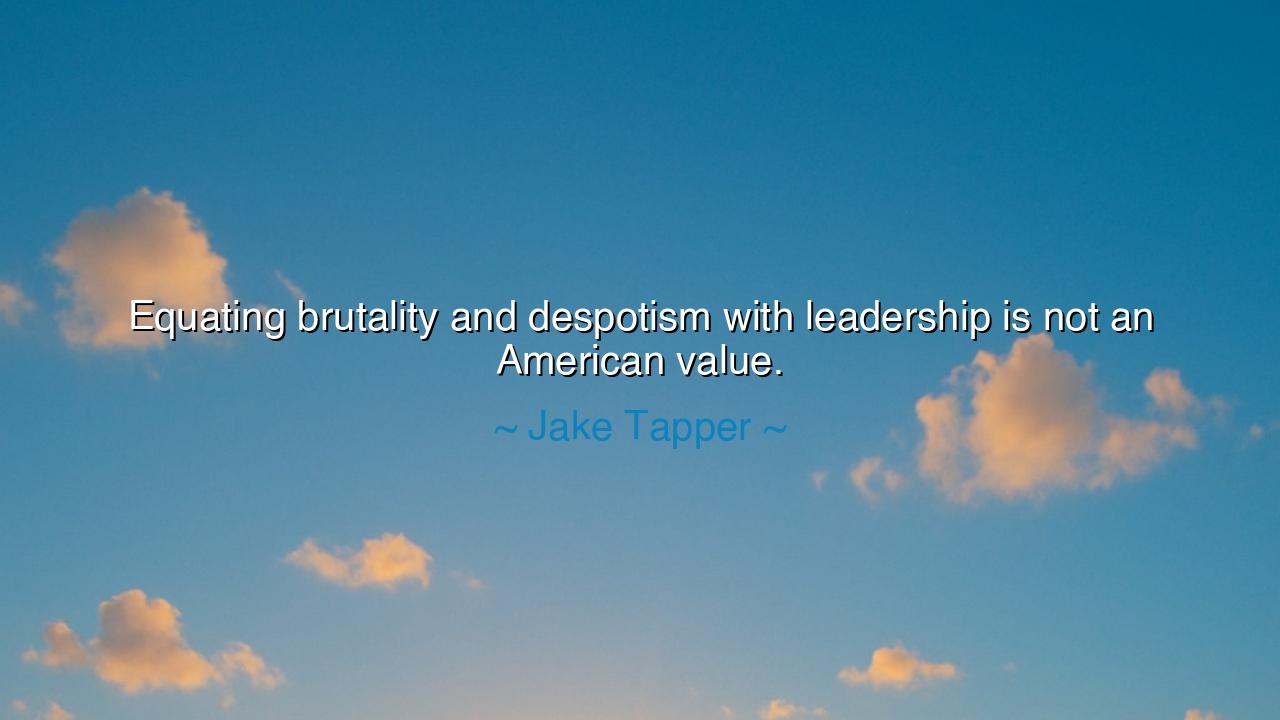
Equating brutality and despotism with leadership is not an






“Equating brutality and despotism with leadership is not an American value.” – Jake Tapper
These words, spoken by Jake Tapper, cut like a clarion through the noise of confusion and fear that sometimes clouds the moral compass of nations. They remind us that true leadership is not born of cruelty, coercion, or domination—but of character, courage, and compassion. His statement is not merely political; it is ethical, almost sacred. It is a reaffirmation of the ancient truth that power without virtue is corruption, and that the spirit of a nation is judged not by the strength of its fist, but by the wisdom of its heart.
The meaning of this quote lies in its moral contrast. Tapper warns against a dangerous confusion that has haunted humanity throughout history: the illusion that brutality equals strength and despotism equals control. Many have mistaken fear for respect and submission for loyalty. Yet the leader who rules through terror is no leader at all—he is a tyrant wearing the mask of authority. True leadership does not demand obedience through fear; it earns trust through integrity. Tapper’s words remind us that the American ideal—indeed, the universal ideal—is not domination, but dignity; not cruelty, but justice.
The origin of this sentiment rises from the very heart of the American story. The United States was founded upon rebellion against despotism—the tyranny of kings and the arrogance of unchecked power. The founders, weary of oppression, built a republic grounded in liberty, equality, and the consent of the governed. From that sacred beginning came a creed: that no man or woman, no matter how powerful, stands above the law or the people. Tapper’s declaration, then, is not new—it is a revival of that original flame, a reminder that the American value system rejects all who would wield authority as a weapon rather than a trust.
History offers countless examples of this eternal struggle between brutality and leadership. Consider the tyrants of the 20th century—men who ruled through fear, silencing dissent and crushing lives beneath the weight of their ambition. They mistook cruelty for power and submission for unity. Their empires burned brightly for a time, but they were built on the sands of fear, and in the end, they collapsed into ash. Contrast them with leaders of conscience like Abraham Lincoln, whose gentleness carried the weight of a divided nation; or Nelson Mandela, who chose forgiveness over revenge after decades of imprisonment. Their greatness was not in domination, but in compassion; not in force, but in the strength of their moral vision.
Tapper’s words are also a warning to the modern age, where image and rhetoric can blur the line between strength and savagery. In times of uncertainty, people often crave authority, mistaking the loudest voice for the wisest one. But when a leader glorifies brutality—whether through speech or policy—they poison the very soil of democracy. Freedom cannot grow where fear takes root. A true leader uplifts, protects, and inspires; a despot degrades, isolates, and consumes. Thus, Tapper calls upon his nation—and all who will listen—to remember that leadership is not measured by domination, but by service to others.
This truth has been recognized by sages since the dawn of civilization. The philosopher-king of Plato’s Republic was to be one who loved wisdom more than power; the Confucian ruler was to govern through virtue rather than decree. Even the ancient Roman Stoics taught that the greatest power is self-control, not control over others. Tapper’s statement, though modern, carries the weight of this ageless philosophy: that brutality reveals weakness, not strength, and that moral leadership is the highest form of authority.
The lesson is clear and timeless. Let us never be seduced by the spectacle of force or the rhetoric of cruelty. Let us remember that the destiny of nations—and of individuals—is shaped by the values we honor in our leaders. Choose those who speak with integrity, who act with empathy, and who see leadership not as a throne to occupy but as a trust to uphold. For as Jake Tapper reminds us, when a society begins to mistake fear for power and cruelty for strength, it loses not only its leaders—it loses its soul.
Therefore, each of us must guard that soul, in our homes, our communities, and our hearts. Let us lead with kindness where others lead with contempt. Let us raise voices of reason when others raise weapons of division. For in the end, the greatest measure of any people is not how they wield power, but how they honor humanity. And in that light, may we never forget: brutality is not leadership, and despotism is not strength—it is the death of both.






AAdministratorAdministrator
Welcome, honored guests. Please leave a comment, we will respond soon